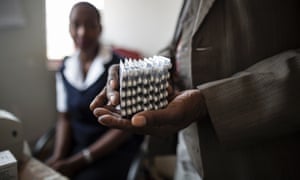
A package of low-cost drugs designed to prevent deadly infections among people who are starting HIV treatment late could save 10,000 lives a year across sub-Saharan Africa, scientists believe.
About one in five people who start HIV treatment in poorer countries are doing so later than advisable, which means they have a low number of CD4 cells, a key component of the immune system. This leaves them far more vulnerable to developing serious illnesses. Roughly one in 10 such people die within the first few weeks of treatment because their immune systems cannot recover fast enough.
HIV prevalence is particularly high in sub-Saharan Africa, with women and children especially vulnerable, but a study led by academics at University College London found that a preventative package of anti-infection drugs significantly reduces the number of deaths from HIV-related illnesses. The researchers estimate that if the drugs were given to every patient in sub-Saharan Africa starting anti-HIV treatment and suffering from a low CD4 count, the drugs could prevent roughly 10,000 deaths each year.
The findings come as more than 6,000 scientists, researchers and global health experts converge on Paris for the IAS conference on HIV science. Delegates at the four-day meeting, which started on Sunday, will discuss the latest developments in HIV research and how the science can be translated into policy.
The UCL study, published in the New England Journal of Medicine, involved 1,805 adults, teenagers and children from across east Africa. Half of the participants were given a drug combination that included medicines used to combat TB (isoniazid), fungal infections (fluconazole),and worms (albendazole). The combination also included two antibiotics, azithromycin and co-trimoxazole,a drug routinely given to people starting HIV treatment in Africa.
Six months after starting this regimen, the mortality rate among patients fell. Almost 9% of patients taking the drug combination died, compared with 12% who didn’t take them. The drugs bundle also reduced illnesses including TB, cryptococcal disease, a potentially fatal fungal infection, and candida disease, a fungal condition.
Diana Gibb, professor of epidemiology at UCL’s medical research council clinical trials, said the package of drugs will help the large number of people who do not realise they have HIV until the later stages, or who do not seek treatment due to stigma.
“Currently, the World Health Organisation says you should look for infections and treat them before or as you start treatment with antiretroviral medicines. The problem is that often primary healthcare centres aren’t able to do that very easily because diagnostics aren’t there, and secondly it causes a delay because you’ve got to have tests done and come back,” she said. “The good thing about this treatment was that you just take the prevention pills at the same time as you start antiretroviral therapy.”
The package is cheap and cost effective, she added. Across all countries involved in the trial, the bundle was roughly £4 more expensive than the standard co-trimoxazole drug given to people starting HIV treatment. By combining some of the drugs into a fixed-dose tablet, academics also ensured that, for most of the 12 weeks, participants were only required to take one extra tablet a day.
James Hakim, professor of medicine at the University of Zimbabwe, said the study demonstrated the importance of measuring CD4 counts before the commencement of HIV treatment.
“Although the average CD4 count among the 1,805 people starting treatment in [the trial] was only 36 cells per cubic millimetre, which is very low, half of them had either no symptoms or only very minor ones,” said Hakim. “This shows the importance of measuring CD4 counts before starting HIV treatment, as there is no other way to identify many who would benefit from this package.”
It was previously routine for all people diagnosed with HIV to have a CD4 count, because this would decide whether an individual was going to start anti-HIV treatment. Now, everyone gets care regardless of their CD4 count, which has led to a slackening of testing in some areas.
The study, which was funded by the Medical Research Council, the UK Department for International Development and the Wellcome Trust, recommended the CD4 test for all people receiving HIV treatment. The researchers said the enhanced package of drugs should become standard for people who have low CD4 counts and start treatment late.
The WHO will decide whether to adopt the treatment over the coming year.
On 20 July, the UN programmes on HIV and Aids reported that 53% of all people living with HIV now had access to treatment – 19.5 million out of 36.7 million. If progress continues at this pace, UNAids said the world would be on track to hit the global target of reaching 30 million people with treatment by 2020
0 comments: